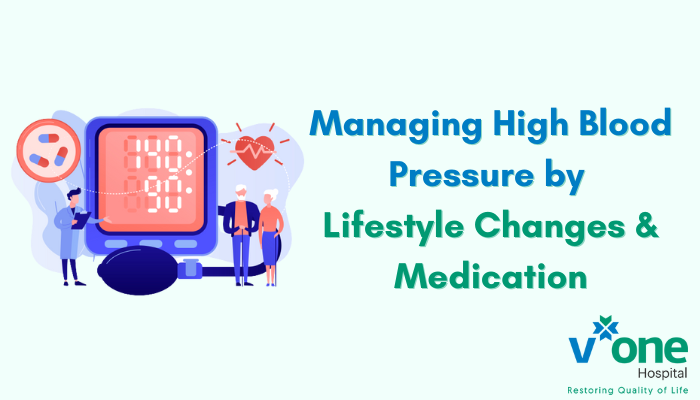Managing High Blood Pressure by Lifestyle Changes & Medication
High blood pressure, often referred to as hypertension, is a common health issue that affects many. It’s crucial to address it as unmanaged high blood pressure can lead to serious health complications. The good news is that with the right approach, it can be managed effectively with the guidance of a reputable heart specialist in Indore. In this article, we will explore the key steps to managing high blood pressure through lifestyle changes and, when necessary, medication.
Understanding High Blood Pressure
Before we delve into management, let’s grasp the basics. Blood pressure is the force exerted by your blood against the walls of your arteries. When this pressure remains consistently high, it strains your heart and blood vessels. Over time, this strain can lead to heart disease, stroke, and other health problems.
Lifestyle Changes for Better Blood Pressure
Here are some lifestyle-changing habits that you can adopt for better blood pressure:
1. Healthy Eating for a Healthy Heart
Your diet holds incredible power over your blood pressure. Embrace a heart-healthy diet that revolves around nutrient-rich foods. Fill your plate with an abundance of fruits and vegetables, whole grains, lean proteins like poultry and fish, and low-fat dairy products. These foods are brimming with vitamins, minerals, and antioxidants that support your cardiovascular system.
The real hero here is potassium. Foods rich in potassium, such as bananas, spinach, and sweet potatoes, help counteract the effects of sodium, which can drive up blood pressure. Additionally, consider cutting back on processed foods, as they often hide excessive amounts of sodium.
2. Get Moving and Stay Active
Physical activity is a non-negotiable component of managing blood pressure. Engaging in regular exercise strengthens your heart and helps it pump blood more efficiently. Aim for at least 150 minutes of moderate-intensity aerobic activity or 75 minutes of vigorous-intensity aerobic activity each week. This could include brisk walking, cycling, swimming, or dancing.
Remember, you don’t have to become a fitness fanatic overnight. Start with manageable goals and gradually increase your activity level. Every step you take contributes to better heart health.
3. Shedding Pounds, Gaining Benefits
Maintaining a healthy weight is a cornerstone of blood pressure management. Excess weight strains your heart and increases your risk of hypertension. By shedding even a modest amount of weight, you can significantly lower your blood pressure and enhance your overall well-being.
Combine your healthy eating habits with regular physical activity to achieve sustainable weight loss. Small, consistent changes can lead to remarkable results over time.
4. Sip Smartly
If you enjoy the occasional alcoholic beverage, moderation is key. While some studies suggest that moderate alcohol consumption may have cardiovascular benefits, excessive drinking can elevate blood pressure. For men, this means up to two drinks per day, and for women, it’s limited to one drink per day.
5. Stress Less, Breathe More
Chronic stress can cause your blood pressure to soar. Incorporate relaxation techniques into your daily routine. Deep breathing exercises, meditation, and yoga can help you manage stress effectively. Cultivating mindfulness not only benefits your heart but also enhances your overall quality of life.
6. Taming the Caffeine Monster
While the connection between caffeine and blood pressure is still being studied, it’s wise to be mindful of your caffeine intake. For some individuals, excessive caffeine consumption can cause a temporary spike in blood pressure. If you’re sensitive to caffeine, consider cutting back and observing its effects on your blood pressure.
The Role of Medication
Lifestyle changes are a strong foundation, but sometimes medication is necessary, especially if your blood pressure remains high. Your heart specialist in Indore will determine the appropriate medication based on your individual needs. Common types of blood pressure medications include:
- Diuretics: These help your body eliminate excess sodium and water, reducing blood volume and pressure.
- Angiotensin-Converting Enzyme (ACE) Inhibitors: They relax and widen blood vessels by reducing the production of angiotensin, a chemical that narrows blood vessels.
- Angiotensin II Receptor Blockers (ARBs): Like ACE inhibitors, ARBs relax blood vessels by blocking the effects of angiotensin.
- Calcium Channel Blockers: These medications help relax blood vessels by blocking calcium from entering cells.
- Beta-Blockers: They reduce heart rate and the heart’s workload, resulting in lower blood pressure.
Personalized Approach to Management
Remember, everyone’s journey is unique. Your heart specialist in Indore will work closely with you to develop a personalized plan. Regular check-ups are vital to monitor your progress and make any necessary adjustments.
Combining Lifestyle Changes and Medication
In many cases, a combination of lifestyle changes and medication yields the best results. Medication can help lower blood pressure while you work on adopting a healthier lifestyle. The ultimate goal is to eventually manage your blood pressure effectively without or with minimal medication.
Staying on Track
Consistency is key. Keep track of your blood pressure at home if recommended by your doctor. Stay committed to your healthy habits and attend follow-up appointments. Your heart specialist may adjust your medication or lifestyle plan based on your progress.
Conclusion
Managing high blood pressure is a journey that requires dedication, but the rewards are immense. By making positive changes to your lifestyle and, when needed, utilizing medication, you’re taking control of your health and reducing the risks associated with high blood pressure. Remember, you’re not alone on this journey – your healthcare provider is there to guide and support you every step of the way. Your commitment today paves the path to a healthier tomorrow.

